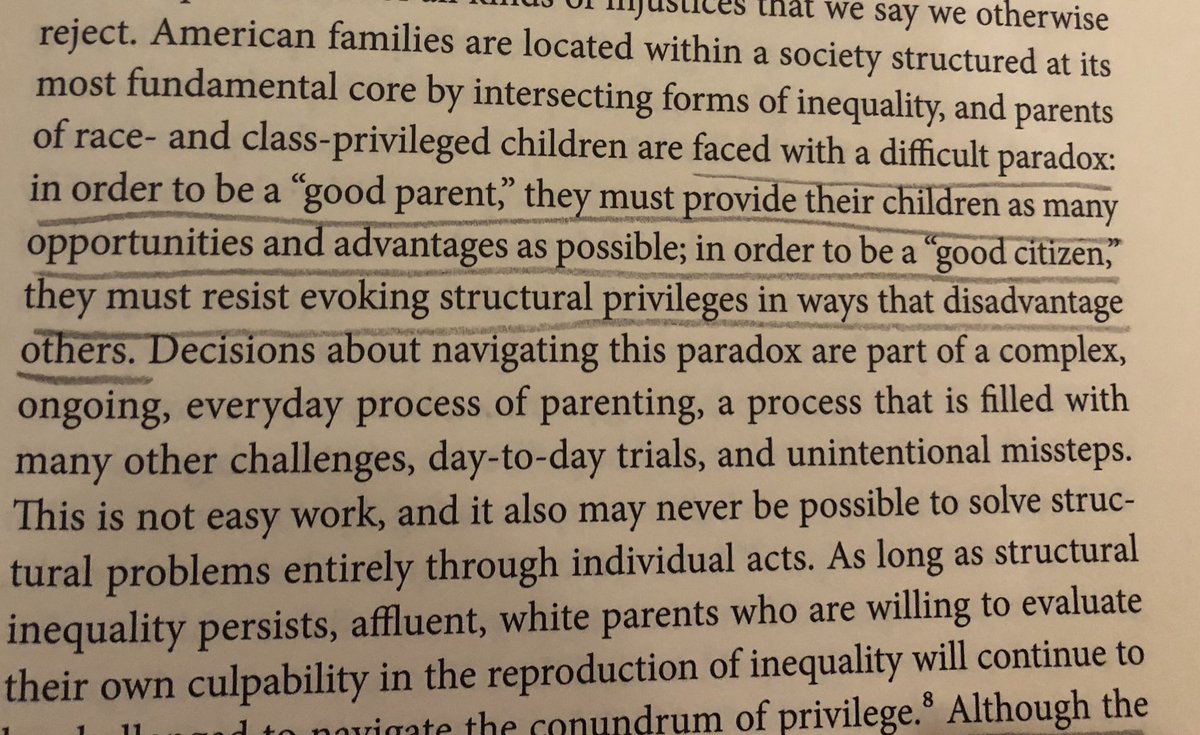Next up in #amreading: “White Kids: Growing Up With Privilege in a Racially Divided America” by Margaret Hagerman. 

(And yes, this one I bought. Usually, I am a devoted @CWMARSinfo user.)
Or @insidehighered (college types, to read!)
https://twitter.com/getraceright/status/1038064454087454720?s=21
“...this book seeks the examine white families with the intention of addressing critically the role that white families play in the production and reproduction of white racial power”
“The parents in this book have access to nearly unlimited resources that allow them to make almost any decision they desire for their children...”
“As such, I can show how ideas about race inform the decisions parents make since their choices are less about availability for resources, or what they can afford, and more about what parents truly think is important or ‘best’ for their child.”
“how do ideologies get socially reproduced by children who benefit the most from the maintenance of these ideologies, and how do ideological positions themselves shape choices involved in raising a child?”
“...white families are the first places where the newest generation of whites learn ideas about race, racism, privilege, and inequality in the United States.”
“While some parents of black children are teaching their kids how to navigate racism to stay alive, some white parents are teaching their kids that race no longer matters in the United States.”
“Further research demonstrates how private businesses and policy makers seek to retain middle-class families in urban schools, valuing them more highly than their working class or poor peers.”
(Where have I heard THAT before? 🤨)
(Where have I heard THAT before? 🤨)
“these parents make decisions that maintain advantage for their own kids that simultaneously have the effect of perpetrating racial equality”
“evidence of the idealogical costs of private schooling comes from the voices of these kids themselves—kids who can speak fluently and critically about race and racial inequality in the United States...
“...but who simultaneously believe they are better and more deserving than anyone else.”
On volunteering and what children may absorb. Hagerman earlier writes of parents teaching (or not) “about systems that have created these racialized patterns in the first place.” 

“This is of course the logical outcome of color-blind ideology: kids who have been told that they should not recognize racial difference feel bad that they do.”
“Racial violence has persisted in this country, but suddenly, over the past few years, there appears to be a newly perceived need for white parents to talk about race with their white children.”
Hagerman adds the importance of white parents “thinking about what they *do* in addition to what they *say*.”
(She then points out that one cannot give up hope and stop trying, and that of course, giving up is not an option open to parents of color.)
“...rejecting the idea that their own child is more innocent and special than other people’s children are.” 

“Indeed, placing value in children collectively rather than individually is the most important way white parents challenge ideologies of parenting that are deeply entwined with the legacy of white supremacy in the United States.”
“accept the radical notion that the happiness, success, health, and well-being of other children is as important as that of their own.”
“the challenge ahead is to rethink taken-for-granted assumptions about what constitutes a ‘good’ school or a ‘good’ neighborhood or even a ‘good’ kid and to decide instead that being a ‘good’ parent means being—and actively raising—a good citizen.”
And white teachers, too.
@threadreaderapp unroll please
• • •
Missing some Tweet in this thread? You can try to
force a refresh








